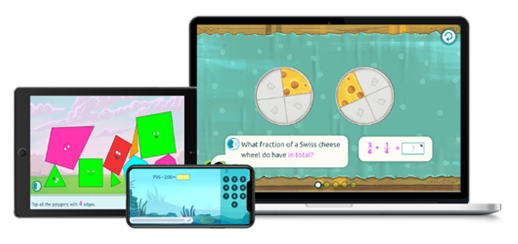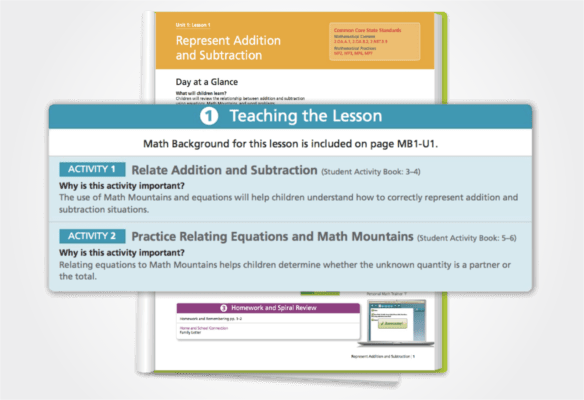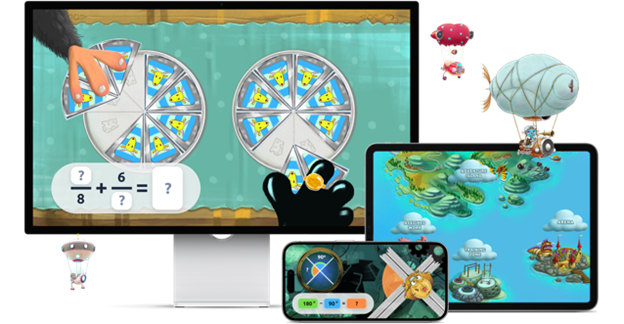From Cover to Cover, Greater Student-Powered Math Instruction
With a vibrant new look, updated enhancements, and expanded content, the newest edition of Math Expressions delivers a truly blended experience that’s more engaging, effective, and empowering. Supercharge engagement and drive deep math learning with more collaboration, problem-solving, and real-world connections -- seamlessly driven by student-centered learning and Math Talk.
Empower students to take charge of their math learning. Math Expressions is a research-proven curriculum that encourages students to get hands-on with math – exploring, discussing, and demonstrating an understanding of key math concepts.
Backed with a decade of research funded by the National Science Foundation (NSF), Math Expressions is a proven Pre-K-6 curriculum that fosters deep understanding through active engagement, collaborative exploration, and hands-on problem solving. Students learn how to look deeper and choose their own path to the answers – skills that will take them far beyond the math classroom. Students just don’t learn math; they experience it, building confidence and lasting comprehension.
Program author Dr. Karen Fuson developed Math Expressions based on the research findings that identify how students build on and use conceptual supports for an inquiry path to learning. Plus, research also identified five crucial core structures – Math Talk, Building Concepts, Quick Practice, Helping Community, and Student Leaders – which are the organizational touchstones implemented throughout the student-centered instruction.
Looking deeper produces exceptional results
Every lesson integrates mathematical
processes and practices.
Students use authentic examples to
make sense of mathematics.
Schools see an average gain of
12-15% on state tests.
Overview
How to think about math
The deep conceptual understanding that's the hallmark of the program leads to strong skills fluency and the ability to make generalizations within and among mathematical strands. As students grow and learn to think critically, teachers develop their own richer understanding of math through detailed instruction and embedded support.

Math Expressions is based on NSF-funded research.
Contextual Learning
Students develop an understanding of mathematics through real-world
situations and visual supports.
Multiple Strategies
Students learn multiple ways to solve problems, including algorithms
based on reasoning.
Manageable Instruction
Teaching materials embody a "learn-while-teaching" style.
Student Experience
Student technology builds understanding, practice, and problem solving.
- Award-Winning Matific delivers friendly and entertaining animated characters who help build confidence that inspires mastery and fluency with encouraging instructions and motivational feedback as students improve, make progress, and earn rewards.
- Games in the online Math Activity Center develop fluency in math facts and operations.
- Students build concrete and pictorial relationships with digital manipulatives.


Lessons build understanding through active inquiry.
Coherence
Students make connections between key topics both within
and
across grades.
Discourse
Math Talk gives students the chance to ask questions and use their
MathBoards to explain and justify their solutions.
Practice
The online Student Activity Book gives young learners the tools to
explore and deepen their understanding of key math concepts.
Teacher Experience

Math Expressions facilitates learning while teaching.
- Professional development, classroom demonstration, and daily routine videos are at point of use in the Teacher Edition.
- Lessons include teaching and inquiry notes, visual models, and suggestions for Math Talk.
- Mathematical processes, practices, and learning progressions are featured in every lesson.
- Formative assessment reporting helps group students for instruction and identifies appropriate differentiation resources.
Differentiated support to encourage all students.
Differentiated Instruction
The Math Activity Center supports every child with
Practice,
Re-teach, and Challenge resources for each lesson.
Adaptive Practice
Customize instruction with the Personal Math
Trainer® Powered by Knewton™, an online
personalized learning and assessment system with real-time reporting
and
adaptive practice.

Math Expressions classrooms are collaborative
Hear from a teacher about how Math Talk engages his class.
Matific
Delivering powerful and informative educational technology, Matific personalizes learning paths to support adaptive engagement for active learning.
- Wrapped in a fun journey of discovery, a carefully curated and rigorous 5-point pedagogy designed by educational experts from leading universities is fully aligned into a robust curriculum of topics and skills.
- Multimedia activities bring learning to life with real-world problems through student agency and adventure driven by challenging responsiveness and rewards.
- Easy to assign digital and printable activities provide teachers formative feedback and real-time insight to inform instruction and monitor progress.

Math Expressions in Spanish
Expresioñes en matemáticas brings the proven curriculum of Math Expressions—in Spanish! Ideal for English learners, or students in Spanish immersion programs, Expresioñes en matemáticas is designed to help students develop content language and literacy skills while building deep conceptual understanding of mathematics.- Built on a Solid Foundation of Research
- Instruction that Supports Language Development
- Available in Both Print and Digital
- Consumable Student Book with cut-out vocabulary cards, paper manipulatives, fluency checks, a glossary, and more
- Homework and Remembering Book that includes daily lesson homework and mixed daily review
- Digital Student Access with virtual manipulative tools, online assessments, adaptive homework support, and more
- Extensive suite of print and digital teacher resources: Teacher Edition, assessment guide, reteach, practice and enrichment activity masters, Math Activity Center with gameboards, math readers, and activity cards
For twenty-five years, Dr. Karen Fuson, Professor Emerita of Education and Psychology at Northwestern University, researched effective methods of teaching and learning mathematics. Results from her research indicated students using the approaches featured in Math Expressions achieved higher rate than students using other programs.
Expresioñes en matemáticas instruction starts at the students' level and continually elicits their thinking; provides visual and linguistic supports to move them rapidly to understanding; and ends with extended fluency practice and application while continuing the emphasis on understanding and explaining.
Making teachers' lives easier by changing the learning landscape
Hear what Dr. Fuson thinks about early learning in mathematics and how it can help close the equity gap.
Early Learning Resources

Classroom Structures Support Understanding and Math Talk
- Students use colorful manipulatives and shape puzzle mats to develop a deep understanding of number and geometry concepts.
- Fun games and puzzle cards engage students and get them excited about mathematics.
- Daily routines include learning the count word sequence and relating to number symbols and quantities through patterns, fingers, and actions.
- Students take turns as student leaders, building confidence over time.
Research tells us that students who start kindergarten with a high level of math understanding do better in both math and reading after kindergarten. With that in mind, we developed Math Expressions Early Learning Resources to provide early learners with the understanding they need to confidently take the first and subsequent steps of their mathematics journey.
Grounded in Research
Students will benefit from teaching-learning paths and structured,
repetitive experiences as recommended in “Mathematics Learning
in
Early Childhood: Paths toward Excellence and Equity.”
Rated as Strong by ESSA
Early Learning Resources is based on the same ESSA
strong
foundation and research as the rest of Math
Expressions,
making it an ideal transitional program for pre-kindergarten early
learners.
Focused on Numbers and Geometry
Research guidelines led to a strong focus on numbers and
geometry, content areas that are particularly important in early
math
instruction.
Hands-On
Playful activities help children see, discuss, and use
mathematical structures, building understanding and fluency
gradually
and systematically.

Outcomes





A Yearlong Study of Success
Students from eight schools across four states showed "statistically significant" improvement.
When children understand math, they're not relying on memorization. They're relying on themselves. Dr. Karen Fuson's comprehensively researched approach to teaching math is based on the way children actually learn and is used across the country because it raises student achievement.

Research & Results
The research driving Math Expressions gives students a full understanding of concepts behind the math and the tools to effectively express what they've learned. Learn more about what's behind the program and its impact on students across the country.
Foundational and Efficacy Research
Math Expressions is based on the results of the NSF-funded Children's Math Worlds research project, a 10-year study led by Dr. Fuson.
Math Expressions Research Evidence Base
- Report Type: Research Evidence Base
- Grade Level: Elementary, Middle
- Highlights: The results of the study showed that students using Math Expressions were performing at higher levels of math achievement when compared with students using similar programs. Math Expressions yielded substantial increases in test scores as well as broader measures of understanding.
US Department of Education Institute of Education Sciences (IES): Achievement Effects of Four Early Elementary School Math Curricula: Finding for First and Second Graders (Year 2)
- Report Type: Efficacy Study, Publication from External Organization, Study Conducted by Third Party
- Grade Level: Elementary
- District Urbanicity: Urban, Suburban
Math Expressions: Impact Study, Grades 2 and 4
- Report Type: Efficacy Study, Study Conducted by Third Party
- Grade Level: Elementary
- Region: Midwest, West
- District Urbanicity: Suburban, Rural
Math Expressions: Efficacy Study, Grades 3 and 5
- Report Type: Efficacy Study, Study Conducted by Third Party
- Grade Level: Elementary
- District Urbanicity: Suburban
- Study Conducted by: Educational Research Institute of America (ERIA)
About the Author
Dr. Karen Fuson, is a leading voice in math education today
Dr. Karen Fuson, Professor Emerita at Northwestern University, has studied how children understand math ideas for more than 50 years. She designs teaching materials based on how children learn and understand, along with working in schools to help teachers support every child.
Related Insights and Resources

Why Inquiry-Based Math Counts on a Helping Community in the Classroom
Building confidence with math learning and teaching, establishing a helping community in the classroom empowers ALL students to learn mathematics through shared responsibilities.

Why Math Talk is the Right Solution for Inquiry-Based Learning, Teaching
Building confidence in math, using Math Talk in the classroom provides frequent opportunities for students to deepen their understanding of concepts while explaining their mathematical thinking and asking questions of other explainers.

Building Meaningful Mathematical Thinking for English Language Learners
Years of research have found that English language learners can learn to solve word problems, even ambitious kinds. They just need many experiences solving, discussing, and writing word problems.


